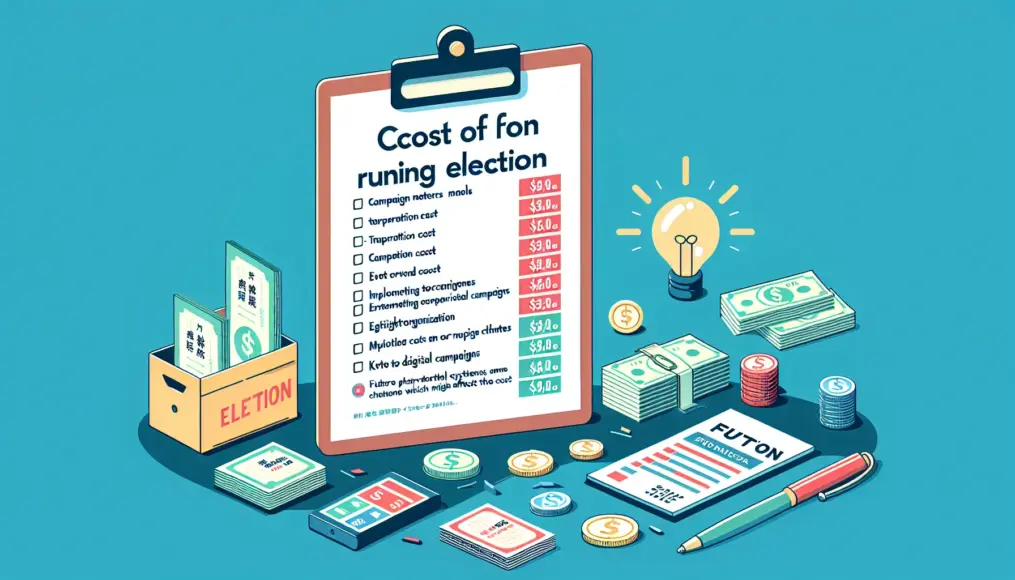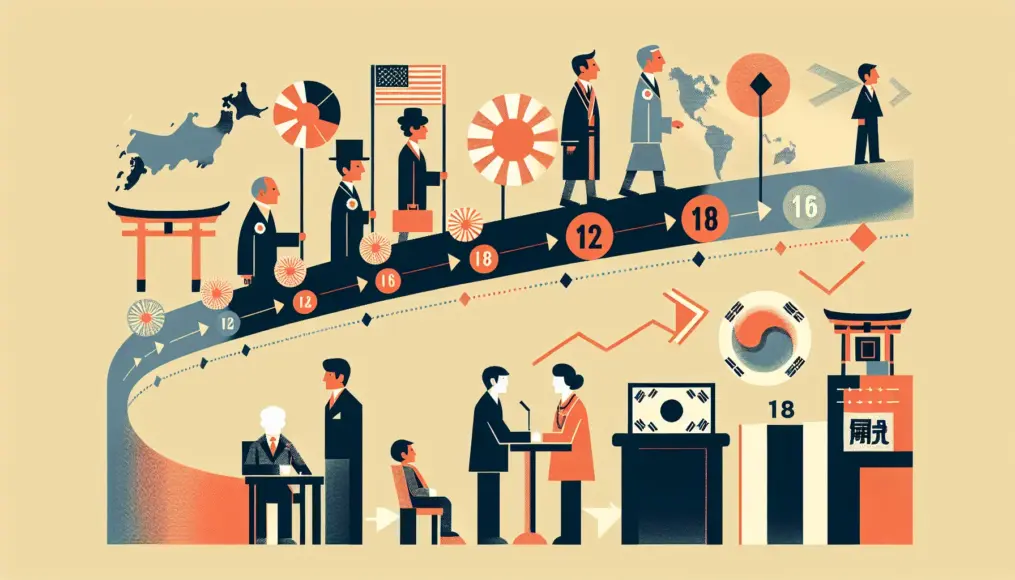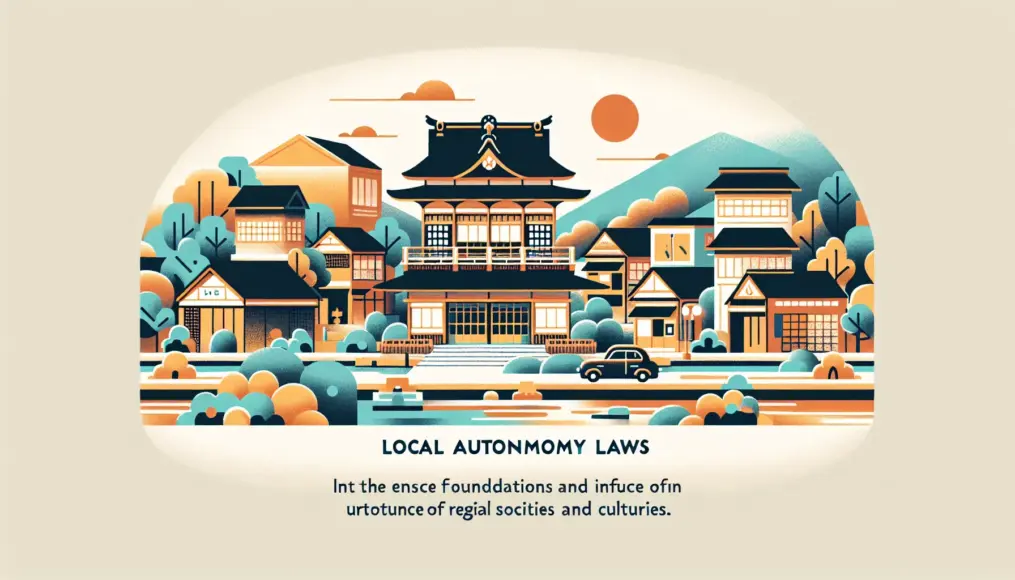Running for office is a dream for many, but turning that dream into reality comes with a variety of costs. By understanding the financial aspects involved, we can help ease some of the anxieties that aspiring candidates may face. In this article, we’ll break down the expenses associated with elections and explore how upcoming changes in election laws might impact these costs.
In addition, having a strategy to manage these expenses is crucial for a successful campaign. By leveraging support networks and digital tools, candidates can conduct their campaigns while keeping costs to a minimum. We’ll also discuss new legal frameworks and fundraising methods that could benefit future candidates, so be sure to stick around until the end.
- An overview of the basic costs associated with running for office
- Insights into the future of election laws and their impact on expenses
- Strategies for minimizing campaign costs
Breakdown of Basic Costs for Running in an Election
Running for office comes with a variety of expenses that candidates need to understand before diving into the electoral process. These costs include everything from registration fees and deposits to expenses necessary for campaigning. By getting a handle on these financial aspects, aspiring candidates can prepare their budgets thoughtfully and ensure a smooth campaign experience.
In this section, we’ll take a closer look at the costs involved in running for office, including the registration fees and the expenses tied to campaigning. This information could serve as a valuable reference for your electoral journey.
Registration Fees and Deposits
To officially enter the race, candidates must first pay registration fees, which can vary depending on the electoral district. There is also a deposit required, which may be refunded based on the election outcome. For instance, if a candidate receives a certain percentage of the votes, the deposit is returned. Therefore, it’s crucial to consider both the registration fees and the deposit when planning your budget.
In addition to these initial costs, candidates must also factor in the expenses associated with their campaign activities. The next section will delve into the specific costs related to running a campaign.
- Registration fees are required to run for office
- Deposits may be refunded based on election results
- Understanding these costs allows for better financial planning
Campaign Expenses
Campaigning involves a range of expenses. For example, there are costs for printing posters and flyers, transportation for public speeches, and hiring staff. These expenses can vary widely depending on the scale and approach of the campaign, so it’s essential to create a budget that aligns with your campaigning style.
Additionally, the rise of social media has introduced a new dimension to campaign strategies, leading to the need for budgeting for digital advertising as well. To effectively run a successful campaign, candidates must clearly understand these expenses and manage their resources wisely.
If you’re interested in the broader implications of campaign expenses, check out this article on “Exploring the Cultural Impact of Election Campaigns and Political Activity.” It offers an in-depth look at how electoral activities influence Japanese culture, providing insights into the diverse aspects of political campaigning.
- Campaign expenses can be quite diverse
- Costs for printing posters and flyers are essential
- Digital advertising on social media must also be considered
The Future of Election Systems and Their Financial Implications
Election systems are continually evolving, and as a result, the costs associated with running for office are also changing. Advances in technology and shifts in policy are expected to significantly impact the expenses involved in campaign activities and fundraising strategies. By understanding these changes, aspiring candidates can better prepare for future elections.
In this section, we will explore how technological advancements and policy changes may affect the cost structures of election campaigns. It’s crucial for those considering a run for office to grasp these factors thoroughly.
The Impact of Technological Advancements
Technological progress has the potential to transform election campaigns dramatically. With the rise of the internet and social media, lower campaign costs are anticipated. Compared to traditional methods like street speeches and printed posters, digital advertising is significantly more cost-effective and allows for a broader reach.
Moreover, improvements in data analytics make it easier to understand voter needs. This enables candidates to devise more efficient campaign strategies, ultimately reducing unnecessary expenses. Such technological advancements can provide considerable advantages to candidates looking to make their mark.
- Technology helps reduce campaign costs
- Digital advertising is low-cost and reaches a wide audience
- Data analysis facilitates the development of effective campaign strategies
The Effects of Policy Changes on Cost Structures
Changes in policies related to election systems are another critical factor influencing cost structures. For instance, if public funding is provided or regulations on campaign activities are relaxed, the financial burden on candidates could be alleviated. This might encourage more individuals to consider running for office.
Conversely, stricter regulations may increase campaign costs, presenting a potential risk for candidates. It’s essential to understand how such policy changes can impact financial aspects when contemplating a run for office. Keeping an eye on future trends in election systems and making appropriate preparations is vital.
The evolution of election systems is a crucial consideration for candidates. If you’re interested in this topic, you might want to check out this article for a deeper understanding: “A Clear Explanation of Single-Member Districts and Proportional Representation: Exploring Their Differences and Benefits.” This resource can help enhance your understanding of election systems.
- Policy changes influence cost structures
- Public funding could ease the financial burden on candidates
- Stricter regulations may increase campaign costs
Strategies for Reducing Campaign Costs
Keeping campaign costs manageable is a crucial issue for many aspiring candidates. While running for office requires funding, there are strategic approaches that can help reduce expenses. Leveraging supporter networks and utilizing digital tools are particularly effective methods for managing costs efficiently. In this section, we’ll delve into specific strategies that you can refer to as you prepare for your campaign.
Candidates who grasp and implement these strategies will be able to conduct their campaigns while minimizing unnecessary expenses. As you gear up for the upcoming elections, consider incorporating these tactics actively.
Leveraging Supporter Networks
The influence of a supporter network can be a tremendous asset when running for office. It can be incredibly challenging to handle a campaign solo, but enlisting the help of supporters and volunteers allows you to share the financial and labor burdens. For instance, you can reach out to local community members, friends, and family for assistance in distributing flyers or supporting your speeches.
Additionally, tapping into the connections of your supporters can open up further opportunities for backing. Participating in local events and gatherings to expand your network can significantly contribute to your campaign’s success.
- Utilizing a supporter network can help reduce costs.
- Gaining volunteer support can streamline your operations.
- Leveraging connections can create opportunities for additional backing.
Streamlining with Digital Tools
In today’s campaigning landscape, harnessing digital tools is vital. By utilizing social media and websites, you can drastically cut down on the costs associated with spreading your message. For example, hosting online campaigns or events eliminates the need for renting physical space.
Moreover, digital tools enable data analysis, which helps you understand voter interests and needs. This understanding allows for the formulation of more effective strategies, ultimately saving you from unnecessary expenditures. In this digital age, actively leveraging these tools is key to achieving success.
If you’re interested in the strategies mentioned in this article on reducing campaign costs, you might also find our piece on “Exploring the Functions and Impact of Unified Local Elections” helpful. This article provides detailed insights into the electoral system’s background and the importance of civic participation, which can be immensely beneficial as you strategize for your campaign. Understanding the electoral framework will empower you to engage in more effective activities.
- Digital tools can help cut campaign costs.
- Online campaigns eliminate the need for physical space costs.
- Data analysis can optimize your strategy.
What You Need to Know to Prepare for Future Elections
Future elections are expected to bring about various changes. Therefore, if you’re considering running for office, having a solid understanding of the laws and regulations is crucial. Election-related laws can change frequently, and adapting to these changes will help ensure a smooth campaign. Additionally, fundraising methods are becoming more diverse, and being informed about these options can significantly aid your candidacy.
In this section, we’ll delve into understanding the laws and regulations, as well as exploring new fundraising techniques. Let’s equip ourselves with this information to prepare for the elections ahead.
Understanding the Laws and Regulations
To run for office, it’s essential to grasp the various laws and regulations in place. This includes rules concerning campaign activities and how funds can be used. For instance, knowing the guidelines for advertising during a campaign and the rules around accepting donations is vital.
By understanding these laws, you can not only avoid violations but also develop effective strategies for your campaign. Learning the rules that govern campaign activities and preparing accordingly is the first step toward success.
- It’s crucial to understand the laws and regulations surrounding elections
- Familiarity with regulations helps avoid violations
- Legal knowledge is essential for formulating effective strategies
New Fundraising Methods
Recently, candidates have access to a wider array of fundraising options. In addition to traditional donations and fundraising events, crowdfunding and online donations are gaining traction. This allows candidates to gather small amounts of money from a larger pool of supporters, broadening their fundraising potential.
Moreover, by utilizing social media to share their activities and values, candidates can attract more supporters and increase their funding. Harnessing the power of digital platforms opens up new avenues for support that weren’t available through traditional methods.
If you found this article interesting, you might also like to check out “The Evolution of Eligibility Age for Candidacy and Its Impact.” This piece explores the history of eligibility age and how the current electoral system has been shaped over time, along with the implications of these changes on society and politics. Be sure to take a look to deepen your understanding of electoral systems.
- Fundraising methods are diversifying
- Crowdfunding and online donations are emerging as new tools
- It’s possible to grow your support base by leveraging social media
Conclusion
Running for office is a dream come true for many, but it comes with a range of costs that can be daunting. Beyond registration fees and campaign expenses, it’s crucial to consider how advancements in technology and changes in legal regulations will impact future campaigns. By tapping into supporter networks and leveraging digital tools, candidates can effectively reduce costs while running a successful campaign.
To prepare for upcoming elections, it’s essential to understand new fundraising methods and the evolving electoral landscape. By keeping these points in mind and approaching your campaign with a solid plan, you can significantly improve your chances of success.
- Running for office requires registration fees and campaign expenses.
- Utilizing supporter networks and digital tools can help cut costs.
- Understanding the law and new fundraising strategies is key to success.
Take the time to prepare thoroughly for your candidacy, and step by step, move closer to realizing your dream. If you have any thoughts or questions about this article, feel free to share them in the comments!



Comment